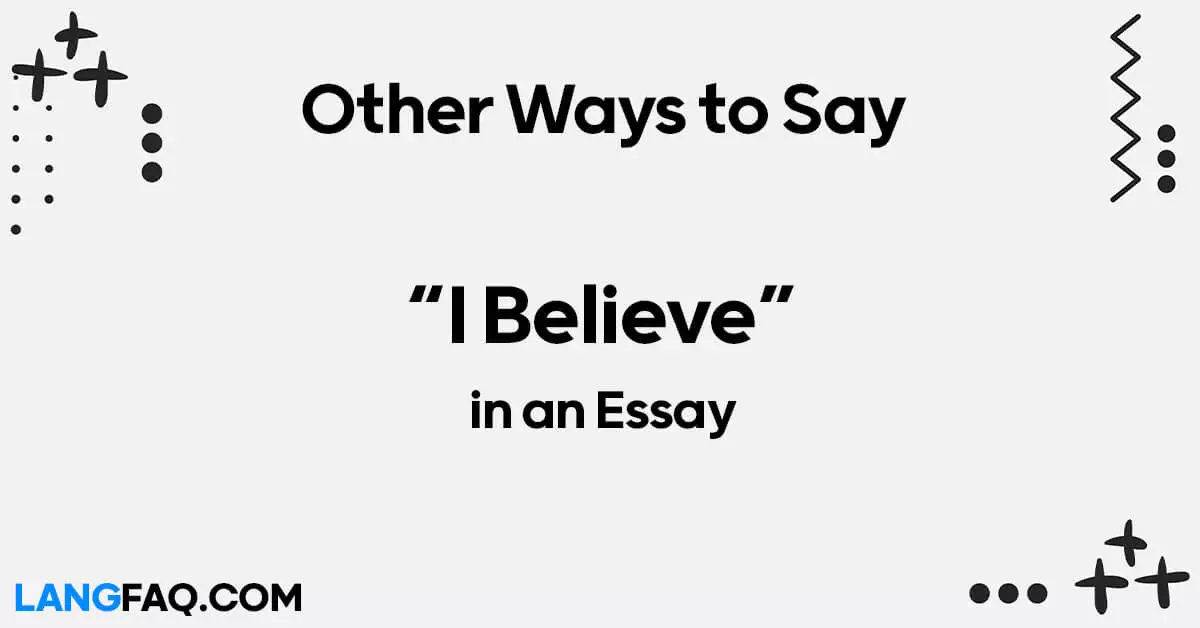Welcome to our educational blog, where we’re dedicated to helping you elevate your command of the English language. In today’s article, we’re delving into the art of essay writing by exploring “12 Other Ways to Say ‘I Believe’ in an Essay.”
Whether you’re a student looking to impress your professors or a professional seeking to communicate with finesse, this article will provide you with valuable insights.
In the following sections, we’ll unlock a treasure trove of synonyms and creative expressions that will enrich your essays.
We understand that effective writing requires nuance and variety, and that’s precisely what we aim to deliver.
By the end of this article, you’ll have a toolkit of phrases at your disposal to convey your beliefs with eloquence and sophistication.
Key Takeaways:
- Uncover 12 synonyms for “I Believe” to diversify your essay vocabulary.
- Learn how to add depth and sophistication to your writing.
- Enhance your ability to convey thoughts and opinions effectively.
12 Other Ways to Say “I Believe” in an Essay
In the world of essay writing, using the same phrase repeatedly can make your writing monotonous and unimpressive. To help you elevate your essays, we’ve compiled a list of 12 alternative expressions for “I Believe.”
These phrases will add flavor and depth to your writing, making your essays stand out:
- In my opinion, – This classic phrase adds a personal touch to your beliefs.
- From my perspective, – Emphasizes your unique viewpoint.
- As far as I’m concerned, – Shows your commitment to your belief.
- It seems to me that, – Expresses a thoughtful observation.
- I am of the view that, – Conveys a structured and considered opinion.
- To my way of thinking, – Highlights your individual thought process.
- If you ask me, – Adds informality while asserting your opinion.
- I’d like to point out that, – Focuses on drawing attention to a specific aspect.
- It’s my contention that, – Suggests a strong belief or argument.
- I maintain that, – Demonstrates a firm stance on the topic.
- In my estimation, – Indicates a thoughtful evaluation.
- It’s worth noting that, – Emphasizes the significance of your belief.
By incorporating these alternatives into your essays, you’ll not only enrich your vocabulary but also convey your ideas with greater precision and impact. Experiment with these phrases and see how they can elevate your writing to the next level.
It’s My Contention That: Expressing Certainty and Conviction
In the realm of essay writing, conveying confidence in your beliefs is essential. The phrase “It’s my contention that” allows you to do just that. It implies a strong belief, showcasing your unwavering conviction in your argument.
When and Where to Use
- Formal Essays: “It’s my contention that” is highly suitable for formal essays, academic papers, or professional reports. It adds an authoritative tone to your writing.
- Professional Communication: You can use this phrase in professional emails or documents when you want to assert your viewpoint with conviction.
- Debates and Presentations: When you’re engaging in a debate or giving a presentation, using this phrase can emphasize your confidence in your position.
Example Sentences
- In a formal essay: “It’s my contention that the impact of climate change on our planet is undeniable, and immediate action is imperative.”
- In a professional email: “It’s my contention that implementing this strategy will lead to significant cost savings for our company.”
Variations for Different Contexts
- Colleagues: “I firmly believe that”
- Friends: “I’m absolutely convinced that”
- Mentor-Mentee: “It’s my strong belief that”
Pros and Cons
Pros:
- Conveys a high level of certainty and conviction.
- Adds an authoritative tone to your writing or speech.
Cons:
- Might sound too formal for casual or creative writing.
- Should be used selectively to avoid overemphasis.
Grammar/Usage Rule: When using “It’s my contention that,” follow it with a complete sentence that elaborates on your belief.
Exception: In very formal contexts, it can be used as a standalone statement.
Definition: According to Cambridge Dictionary, “contention” means “a strong opinion that is expressed with confidence.”
Tips: Use this phrase when you want to assert your viewpoint firmly, but be mindful of its formality and use it appropriately in different contexts.
I Am Convinced That: Emphasizing Certainty and Belief
When you want to convey a high level of certainty and belief in your writing, the phrase “I am convinced that” is a powerful choice. It leaves no room for doubt and shows your unwavering commitment to your perspective.
When and Where to Use
- Formal Essays: “I am convinced that” is suitable for formal essays and academic papers when you want to assert your viewpoint confidently.
- Persuasive Writing: In persuasive essays or speeches, this phrase can make your arguments more compelling by highlighting your strong belief.
- Professional Correspondence: Use it in professional emails or reports to express your certainty in a particular course of action.
Example Sentences
- In a formal essay: “I am convinced that renewable energy is the key to a sustainable future.”
- In a persuasive speech: “I am convinced that our community will benefit greatly from investing in education.”
Variations for Different Contexts
- Colleagues: “I firmly believe that”
- Friends: “I wholeheartedly believe that”
- Mentor-Mentee: “I am steadfast in my belief that”
Pros and Cons
Pros:
- Conveys unwavering certainty and belief.
- Enhances the persuasive impact of your writing or speech.
Cons:
- May sound overly assertive in some contexts.
- Should be used judiciously to avoid appearing dogmatic.
Grammar/Usage Rule: Follow “I am convinced that” with a complete sentence that provides context or elaborates on your belief.
Definition: According to Cambridge Dictionary, “convinced” means “completely certain or sure about something.”
Tips: Use this phrase when you want to emphasize your strong conviction, but be aware of the potential for it to come across as too assertive in certain situations. Use it with confidence, but also with sensitivity to your audience’s expectations.
My Stance Is That: Clarifying Your Position
In the world of essay writing, clarity is key. You want your readers to understand your position on a topic unequivocally. The phrase “My stance is that” is a straightforward way to achieve this, making your perspective clear and concise.
When and Where to Use
- Formal Essays: “My stance is that” is ideal for formal essays, research papers, or any academic writing where you need to express your viewpoint clearly.
- Debates and Discussions: In debates or discussions, using this phrase can help you state your position in a way that leaves no room for misinterpretation.
- Argumentative Writing: If you’re writing an argumentative essay, this phrase can be particularly effective in presenting your thesis statement.
Example Sentences
- In a formal essay: “My stance is that access to quality healthcare is a fundamental human right.”
- In a debate: “My stance is that stricter environmental regulations are necessary to combat climate change.”
Variations for Different Contexts
- Colleagues: “I firmly hold that”
- Friends: “I strongly believe that”
- Mentor-Mentee: “My unwavering position is that”
Pros and Cons
Pros:
- Provides clarity about your position.
- Effective for stating your thesis or central argument.
Cons:
- Can be considered somewhat formal for casual writing.
- Use it selectively to avoid repetitiveness in your writing.
Grammar/Usage Rule: Follow “My stance is that” with a clear and concise statement of your position or belief.
Definition: According to Cambridge Dictionary, “stance” refers to “a particular way of thinking about something, especially expressed in a publicly stated opinion.”
Tips: Use this phrase when you want to leave no room for ambiguity regarding your position on a topic. It’s especially useful in academic or formal contexts where clarity is paramount.
I Maintain That: Upholding Your Belief
When you want to convey a sense of active commitment to your belief, the phrase “I maintain that” is a powerful choice. It suggests that you not only hold a particular viewpoint but also actively stand by it.
When and Where to Use
- Formal Essays: “I maintain that” is appropriate for formal essays, research papers, or any academic writing where you want to assert your commitment to your belief.
- Argumentative Writing: In argumentative essays, this phrase can emphasize your unwavering support for your thesis.
- Professional Discussions: Use it in professional discussions or presentations to demonstrate your firm belief in a particular idea or strategy.
Example Sentences
- In a formal essay: “I maintain that art has the power to shape society and inspire change.”
- In a professional presentation: “I maintain that our company’s commitment to sustainability sets us apart from our competitors.”
Variations for Different Contexts
- Colleagues: “I stand firmly by the belief that”
- Friends: “I passionately believe that”
- Mentor-Mentee: “I uphold the view that”
Pros and Cons
Pros:
- Expresses active commitment to your belief.
- Adds a level of conviction and dedication to your writing or speech.
Cons:
- May come across as overly assertive in some contexts.
- Use it judiciously to avoid appearing dogmatic.
Grammar/Usage Rule: Follow “I maintain that” with a clear and concise statement that reinforces your belief.
Definition: According to Cambridge Dictionary, “maintain” means “to continue to believe or do something, or to state that something is true, even though it may not be generally accepted.”
Tips: Use this phrase when you want to emphasize your active commitment to your belief. It conveys a strong sense of dedication and can be particularly effective in persuasive or argumentative writing. However, be mindful of the context and tone to avoid appearing too forceful.
In My Estimation: Emphasizing Thoughtful Consideration
In the realm of essay writing, showcasing your thoughtful consideration of a topic is essential. The phrase “In my estimation” allows you to do just that. It emphasizes that your viewpoint is the result of careful evaluation and analysis.
When and Where to Use
- Formal Essays: “In my estimation” is well-suited for formal essays, academic papers, or any writing where you want to convey that your viewpoint is the result of thorough consideration.
- Analytical Writing: If you’re writing an analytical essay, this phrase can underscore the depth of your analysis.
- Professional Reports: Use it in professional reports or documents when you want to express that your conclusions are based on meticulous examination.
Example Sentences
- In a formal essay: “In my estimation, the economic benefits of sustainable agriculture far outweigh the initial investment.”
- In a research paper: “In my estimation, the data supports the hypothesis that increased exercise leads to improved mental health.”
Variations for Different Contexts
- Colleagues: “I’ve carefully considered and believe that”
- Friends: “After thoughtful reflection, I believe that”
- Mentor-Mentee: “In my considered judgment, I hold that”
Pros and Cons
Pros:
- Demonstrates that your viewpoint is the result of careful analysis.
- Adds an air of authority and thoughtfulness to your writing.
Cons:
- May be considered somewhat formal for casual writing.
- Use it selectively to avoid overemphasizing your analysis.
Grammar/Usage Rule: Follow “In my estimation” with a clear and concise statement that reflects your thoughtful analysis of the topic.
Definition: According to Cambridge Dictionary, “estimation” refers to “the act of forming an opinion about something.”
Tips: Use this phrase when you want to convey that your viewpoint is the product of thorough consideration and analysis. It’s particularly effective in academic or formal contexts where demonstrating thoughtfulness is important.
To My Way of Thinking: Inviting Perspective
In the world of essay writing, inviting readers to see things from your perspective can be a powerful tool. The phrase “To my way of thinking” does just that. It adds a personal touch and encourages readers to consider your viewpoint.
When and Where to Use
- Formal Essays: “To my way of thinking” is suitable for formal essays, research papers, or any academic writing where you want to invite readers to see things from your perspective.
- Opinion Pieces: In opinion-based essays or editorials, this phrase can help you establish your unique viewpoint.
- Persuasive Writing: Use it in persuasive essays or speeches to encourage your audience to adopt your perspective.
Example Sentences
- In a formal essay: “To my way of thinking, the principles of democracy are the foundation of a just society.”
- In an opinion piece: “To my way of thinking, the arts play a vital role in fostering creativity and innovation.”
Variations for Different Contexts
- Colleagues: “From my perspective, I believe that”
- Friends: “In my view, I think that”
- Mentor-Mentee: “To my understanding, I hold that”
Pros and Cons
Pros:
- Invites readers to consider your viewpoint.
- Adds a personal touch to your writing, making it more relatable.
Cons:
- Can be considered somewhat informal for highly formal writing.
- Ensure it aligns with the tone and context of your piece.
Grammar/Usage Rule: Follow “To my way of thinking” with a clear statement that presents your perspective or belief.
Definition: According to Cambridge Dictionary, “perspective” refers to “a particular way of considering something.”
Tips: Use this phrase when you want to invite readers to view the topic from your perspective. It adds a personal touch to your writing and encourages engagement by inviting consideration of your viewpoint. Be mindful of the formality of your writing and use it appropriately.
It Appears to Me That: Conveying Introspection and Reflection
In the realm of essay writing, expressing introspection and reflection can add depth to your arguments. The phrase “It appears to me that” allows you to do just that. It conveys a sense of personal contemplation and invites readers to explore your insights.
When and Where to Use
- Formal Essays: “It appears to me that” can be used in formal essays and academic papers when you want to express your viewpoint while acknowledging your own reflection.
- Reflective Writing: In reflective essays or pieces where personal insight is valuable, this phrase can emphasize your contemplative approach.
- Persuasive Writing: Use it in persuasive essays or speeches to present your arguments as a product of careful consideration.
Example Sentences
- In a formal essay: “It appears to me that the role of technology in education is continually evolving.”
- In a reflective essay: “It appears to me that my experiences have shaped my perspective on leadership.”
Variations for Different Contexts
- Colleagues: “In my personal reflection, I believe that”
- Friends: “As I’ve thought about it, I feel that”
- Mentor-Mentee: “Through introspection, I’ve come to the conclusion that”
Pros and Cons
Pros:
- Conveys introspection and personal reflection.
- Invites readers to consider your insights and perspective.
Cons:
- May be perceived as somewhat informal for highly formal writing.
- Use it in contexts where personal reflection is appropriate.
Grammar/Usage Rule: Follow “It appears to me that” with a clear statement that reflects your introspection and personal insight.
Definition: According to Cambridge Dictionary, “introspection” refers to “the examination of and attention to your own ideas, thoughts, and feelings.”
Tips: Use this phrase when you want to convey a sense of personal reflection and introspection in your writing. It adds depth to your arguments and invites readers to explore your insights. Be mindful of the context and tone of your writing to use it effectively.
My Viewpoint Is That: Clarity in Expression
Clarity in essay writing is paramount, especially when expressing your beliefs. The phrase “My viewpoint is that” is a straightforward way to achieve this, ensuring your perspective is clear and easily understood by your readers.
When and Where to Use
- Formal Essays: “My viewpoint is that” is appropriate for formal essays, academic papers, or any writing where you need to express your viewpoint with precision.
- Analytical Writing: If you’re writing an analytical essay or report, this phrase can help you present your perspective in a clear and concise manner.
- Professional Documents: Use it in professional documents, such as reports or proposals, to ensure your viewpoint is explicitly stated.
Example Sentences
- In a formal essay: “My viewpoint is that cultural diversity enriches our society in numerous ways.”
- In a professional report: “My viewpoint is that the proposed strategy aligns with our long-term goals.”
Variations for Different Contexts
- Colleagues: “I hold the perspective that”
- Friends: “I believe that”
- Mentor-Mentee: “From my standpoint, I think that”
Pros and Cons
Pros:
- Provides clarity and precision in expressing your viewpoint.
- Suitable for both formal and professional writing contexts.
Cons:
- May sound somewhat formal for casual writing.
- Use it selectively to avoid repetitiveness in your writing.
Grammar/Usage Rule: Follow “My viewpoint is that” with a clear and concise statement of your perspective or belief.
Definition: According to Cambridge Dictionary, “viewpoint” refers to “a way of considering something.”
Tips: Use this phrase when you want to ensure your viewpoint is expressed with utmost clarity. It’s particularly effective in formal and professional contexts where precision is crucial. Be mindful of the context and tone to use it appropriately.
In My Considered Judgment: A Deliberate Perspective
When you wish to convey a perspective rooted in careful thought and consideration, the phrase “In my considered judgment” is a distinguished choice. It signifies that your viewpoint is the product of thorough analysis and evaluation.
When and Where to Use
- Formal Essays: “In my considered judgment” is fitting for formal essays, research papers, or academic writing where you want to emphasize your thoughtful approach.
- Analytical Writing: In analytical essays or reports, this phrase can underscore the depth of your analysis and conclusions.
- Professional Reports: Use it in professional documents, such as reports or proposals, to express that your judgments are based on meticulous examination.
Example Sentences
- In a formal essay: “In my considered judgment, the ethical implications of artificial intelligence warrant careful scrutiny.”
- In a professional report: “In my considered judgment, the data indicates a need for strategic adjustments in our marketing approach.”
Variations for Different Contexts
- Colleagues: “I’ve thoroughly examined and believe that”
- Friends: “After careful thought, I feel that”
- Mentor-Mentee: “Through in-depth analysis, I’ve arrived at the conclusion that”
Pros and Cons
Pros:
- Conveys a perspective rooted in careful analysis and judgment.
- Adds an air of authority and thoughtfulness to your writing.
Cons:
- May be considered somewhat formal for casual writing.
- Ensure it aligns with the tone and context of your piece.
Grammar/Usage Rule: Follow “In my considered judgment” with a clear and concise statement that reflects your thorough analysis and judgment.
Definition: According to Cambridge Dictionary, “considered” means “thought carefully about something.”
Tips: Use this phrase when you want to emphasize the depth of your analysis and judgment in your writing. It adds a sense of authority and thoughtfulness to your arguments, making it particularly effective in formal and professional contexts. Be mindful of the context and tone to use it appropriately.
From My Perspective: Sharing Personal Insight
In the world of essay writing, sharing personal insight can be a powerful way to engage your readers. The phrase “From my perspective” accomplishes just that. It conveys that your viewpoint is shaped by your unique experiences and observations.
When and Where to Use
- Formal Essays: “From my perspective” is suitable for formal essays, research papers, or academic writing where you want to incorporate a personal touch.
- Persuasive Writing: In persuasive essays or speeches, this phrase can make your arguments more relatable by emphasizing your personal viewpoint.
- Professional Communication: Use it in professional emails, reports, or documents when you want to express your perspective while acknowledging its personal nature.
Example Sentences
- In a formal essay: “From my perspective, the role of art in society extends beyond aesthetics; it serves as a reflection of our cultural identity.”
- In a professional email: “From my perspective, the proposed project timeline is ambitious but achievable.”
Variations for Different Contexts
- Colleagues: “Based on my experiences and observations, I believe that”
- Friends: “In my personal view, I think that”
- Mentor-Mentee: “Drawing from my own insights, I hold that”
Pros and Cons
Pros:
- Shares personal insight and experiences, making your writing more relatable.
- Adds a personal touch while maintaining a formal tone.
Cons:
- May not be suitable for highly formal or objective writing where personal perspective is discouraged.
- Use it in contexts where personal insight is relevant and adds value.
Grammar/Usage Rule: Follow “From my perspective” with a clear statement that presents your personal viewpoint or belief.
Definition: According to Cambridge Dictionary, “perspective” refers to “a particular way of considering something.”
Tips: Use this phrase when you want to incorporate a personal touch and share your unique perspective in your writing. It can make your arguments more relatable and engaging, particularly in formal and professional contexts. Be mindful of the context and tone to use it effectively.
To My Mind: Expressing Personal Opinion
When you want to express your personal opinion in a straightforward and clear manner, the phrase “To my mind” is an excellent choice. It allows you to share your viewpoint while maintaining a respectful and thoughtful tone.
When and Where to Use
- Formal Essays: “To my mind” can be used in formal essays, research papers, or academic writing to express your personal opinion in a respectful way.
- Persuasive Writing: In persuasive essays or speeches, this phrase can help you present your arguments as the product of your personal perspective.
- Professional Correspondence: Use it in professional emails, reports, or documents to convey your opinion while acknowledging its personal nature.
Example Sentences
- In a formal essay: “To my mind, the ethical implications of genetic engineering are complex and require careful consideration.”
- In a professional report: “To my mind, the proposed marketing strategy aligns well with our brand identity.”
Variations for Different Contexts
- Colleagues: “In my personal opinion, I believe that”
- Friends: “Personally, I think that”
- Mentor-Mentee: “In my view, I hold that”
Pros and Cons
Pros:
- Expresses personal opinion in a clear and respectful manner.
- Suitable for both formal and professional writing contexts.
Cons:
- May not be appropriate in highly formal or objective writing.
- Use it selectively to avoid overemphasizing personal opinion.
Grammar/Usage Rule: Follow “To my mind” with a clear and concise statement that presents your personal opinion or belief.
Definition: According to Cambridge Dictionary, “mind” refers to “the part of a person that makes it possible for him or her to think, feel emotions, and understand things.”
Tips: Use this phrase when you want to express your personal opinion in a clear and respectful way. It’s particularly effective in formal and professional contexts where you want to convey your viewpoint while maintaining a respectful tone. Be mindful of the context and tone to use it appropriately.
In conclusion, mastering the art of expression is crucial in essay writing. “12 Other Ways to Say ‘I Believe’ in an Essay” equips you with the tools needed to articulate your beliefs effectively. With these alternatives, you’ll infuse your essays with freshness and sophistication, leaving a lasting impression on your readers.
So go ahead, explore these phrases, and watch your writing soar to new heights.







